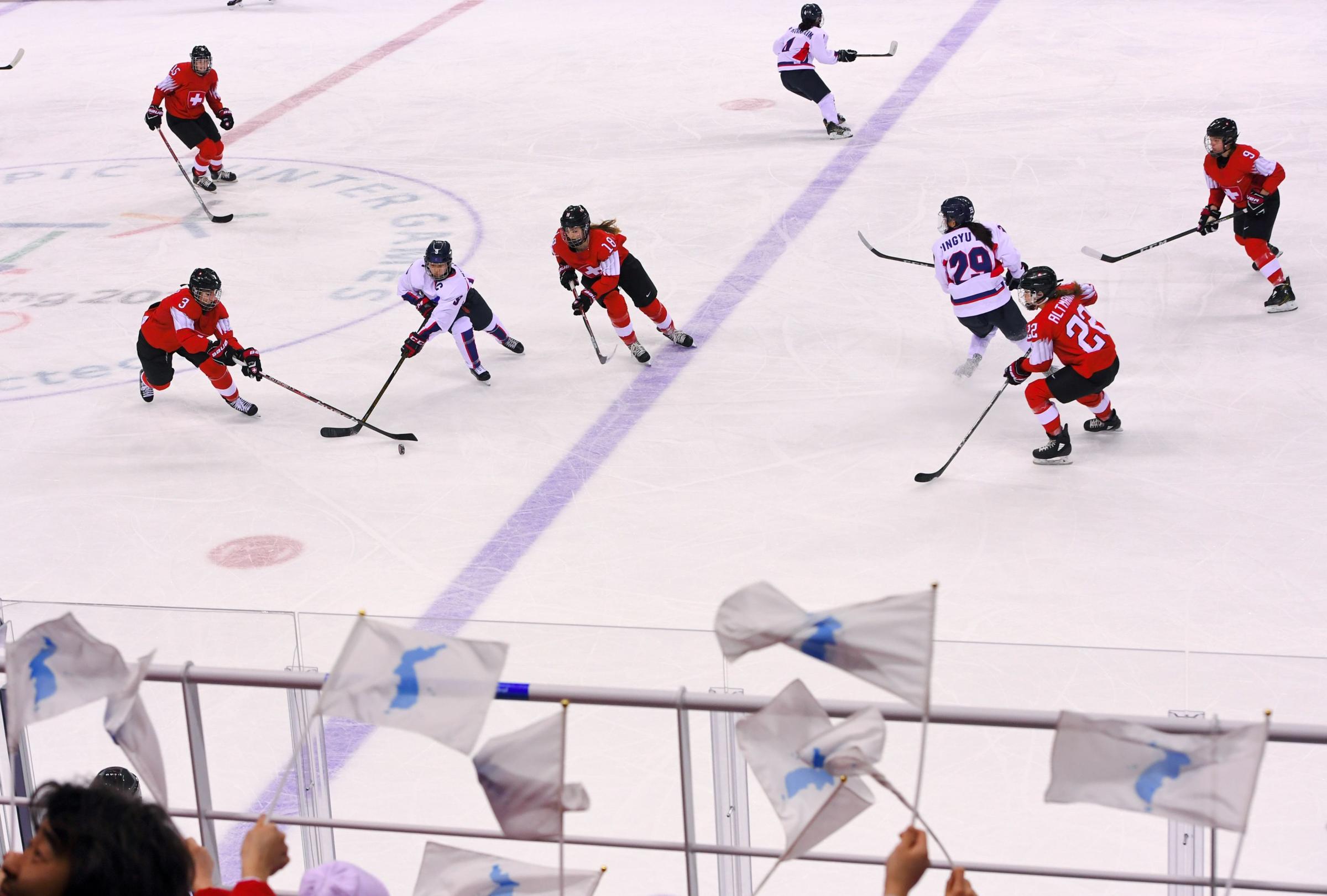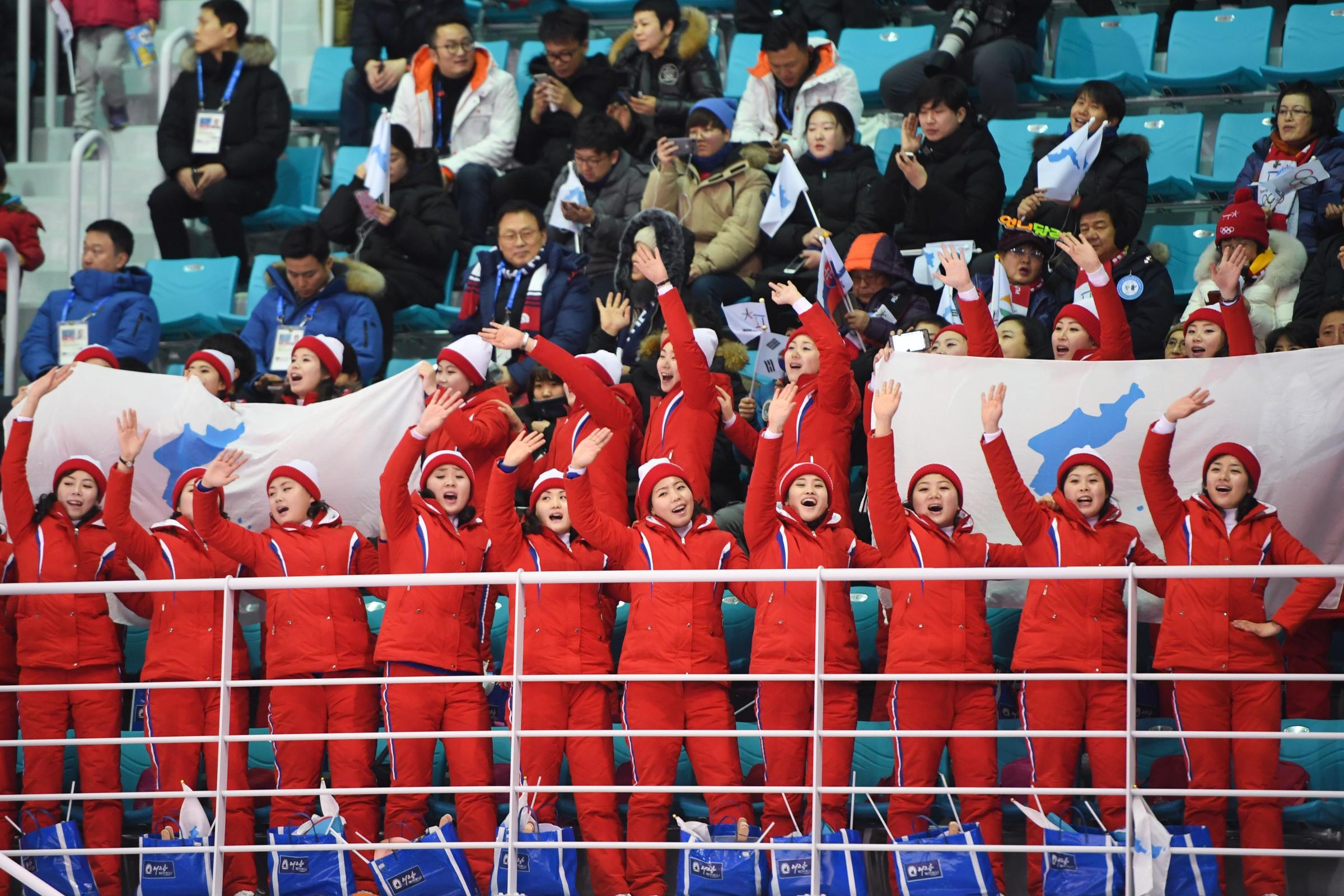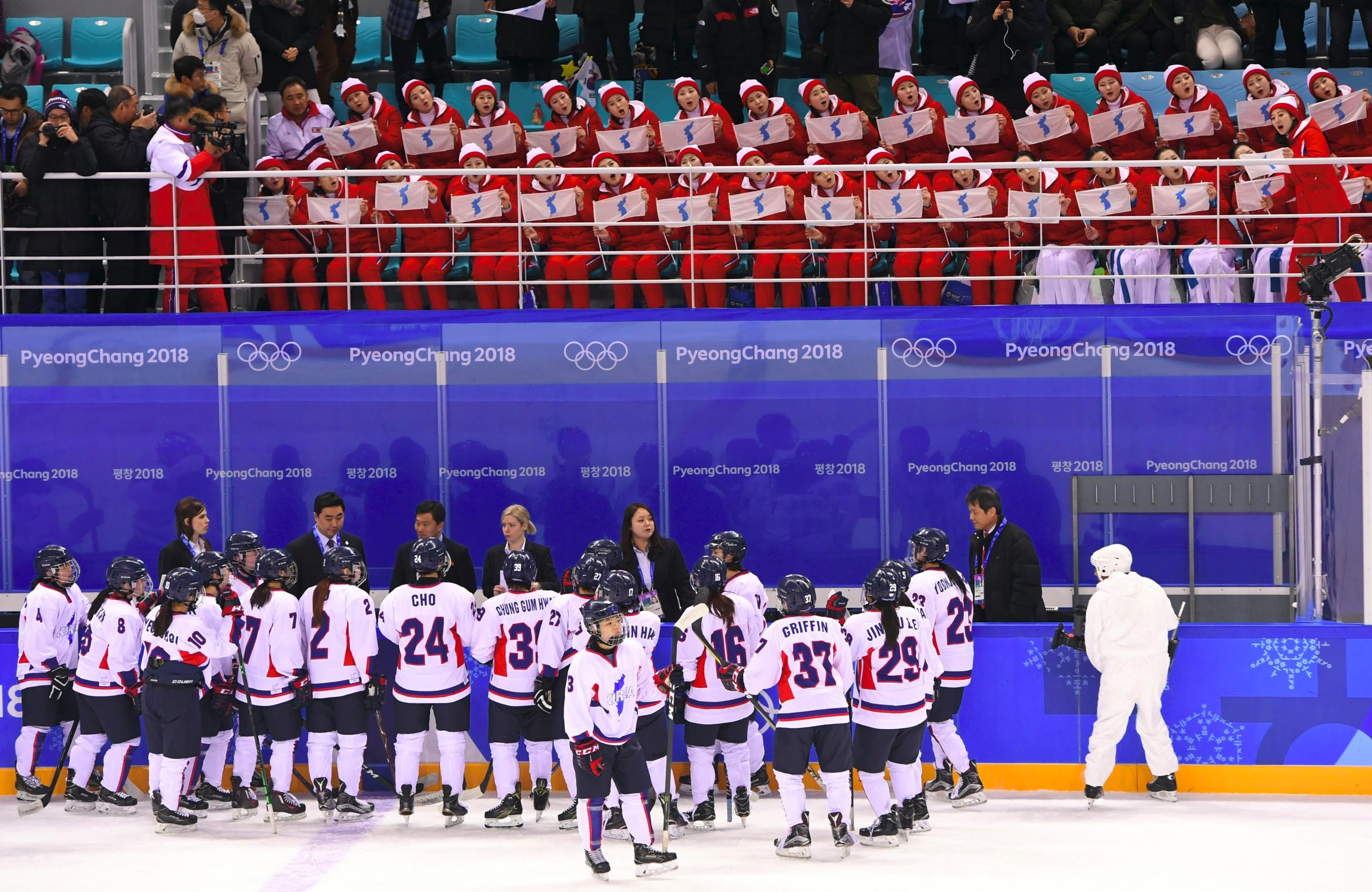Every time Switzerland scored a goal against Korea’s unified women’s hockey team on Saturday night in Gangneung, the 100-plus member North Korean cheerleading squad, women all dressed in red jackets and white winter hats, began to chant in Korean. “Cheer up!” they told the Korean team, pointing a unified Korean flag at the players. “Cheer up!” For Korean hockey fans, these encouraging words became a bit too familiar at the Kwandong Hockey Centre during the home team’s 8-0 loss to Switzerland at the 2018 Winter Olympics.
For the first time in Olympic history, North Korea and South Korea competed as one. Over the last few days the world has witnessed unprecedented acts of cooperation, symbolic or otherwise, between South Korea and its nuclear-armed neighbor to the North. The two countries marched under a united Korean flag at Friday night’s Olympic opening ceremonies in PyeongChang.
The first member of North Korea’s dynastic Kim family — Kim Yo-jong, younger sister of North Korean supreme leader Kim Jong-un — shook hands with South Korean president Moon Jae-in at the Opening Ceremonies on Friday. On Saturday, Kim Yo-jong passed along a request for Moon Jae-in to meet her brother in Pyeongyang, the North Korean capital. South Korea’s Moon Jae-in and Kim Yo-jong both attended the hockey game against Switzerland.

For some South Korean hockey players, however, displays of cooperation come with a cost. A dozen North Korean players were added to the team in January — awfully late in the game.
“I didn’t ever anticipate this happening,” says Sarah Murray, the team’s Canadian coach. “It was out of our control.”
Murray said that she heard rumors floating around in July that the two Koreas would unify. Those rumors soon dissipated. “Right now,” says Murray. “I’m really wishing it would have happened in July. We would have had a full season to work with them.”
The IOC gave the Korean team license expand its roster from 23 to 35 players. At the Olympics, 22 players can suit up for games; as part of the agreement, Murray would have to suit up at least three North Korean players for each game, as she did on Saturday. The deal, which was announced right after South Korea finalized its roster, takes ice time away from South Koreans who earned their way onto the team.
“It’s really tough,” says Murray. “You have to tell the these players, ‘oh, you’re going to the Olympics. And then you have to tell them oh, you might not play in the Olympics.'”
Murray fretted that the new North Korean players would disrupt locker room relationships. But this fear has been unfounded. “The chemistry on the team is better than I ever could have predicted,” she says. “They hang out together, they eat meals together. I’ll walk into the locker room and they’re all laughing together. You can’t tell who’s from the North and who’s from the South. They’re just girls playing hockey.”
Incorporating the North Koreans on the ice, however, has proven more difficult.

“Communication has been an issue,” says South Korean player Randi Griffin, who grew up in the United States but has Korean citizenship (she’s studying for a PhD in evolutionary anthropology at Duke). North Korea and South Korea use different hockey terms; the extra translations fritter away practice time. In their Olympic training, South Korean team played exhibition games against top U.S. college teams. North Korea didn’t benefit from such high-level prep.
“The North Korean players really haven’t had exposure to that before,” says Griffin. “This is the first time ever they’ve seen that much speed on the ice.”
The South Korean public hasn’t completely embraced hockey history. A man wearing a South Korea hockey jersey offered a sharp thumbs down when asked if he were happy about the team’s North Korean presence. Grace Koo, a South Korean citizen who attends Andrews University in Berrien Springs, Michigan, also disapproves of the combined Korean team.
“It’s very sad to see,” says Joo, 22. “The South Korean players trained so many years. The Olympics became very political. And I didn’t want that.”

It’s hard to picture the South Korean team beating Switzerland even if it didn’t have to manage the North Korea issue. Swiss forward Alina Muller scored four goals in 22 minutes. And many South Koreans are hopeful that this game marks the start of real cooperation between North and South. That Olympic unity is more than just propaganda.
The building was buzzing; the North Korean cheerleaders, stationed in seven different sections of the arena, bobbed their heads from side to side, swayed their arms, and at one point even did a little wave. They mostly cheered while seated. They did stay silent as Queen’s “We Will Rock You” blared throughout the arena. And while most of the crowd shimmied to a performer singing “Uptown Funk” at the first intermission, the cheerleaders carried on with their traditional songs.
Some bridges still need building. But you have to start with a foundation. Why not, some South Koreans wondered on Saturday, an Olympic hockey game? Despite the lingering pains of war between the two Koreas, Sekyung Lee, who works for a chemical company in Seoul, insists a new generation will embrace change.
“This is very amazing,” says Lee, 39, while looking down on the ice, his seven-year-old daughter sitting beside him. “I hope to see the unification of our country. Seeing this team makes me so, so happy.”
More Must-Reads from TIME
- Why Trump’s Message Worked on Latino Men
- What Trump’s Win Could Mean for Housing
- The 100 Must-Read Books of 2024
- Sleep Doctors Share the 1 Tip That’s Changed Their Lives
- Column: Let’s Bring Back Romance
- What It’s Like to Have Long COVID As a Kid
- FX’s Say Nothing Is the Must-Watch Political Thriller of 2024
- Merle Bombardieri Is Helping People Make the Baby Decision
Write to Sean Gregory/Gangneung at sean.gregory@time.com